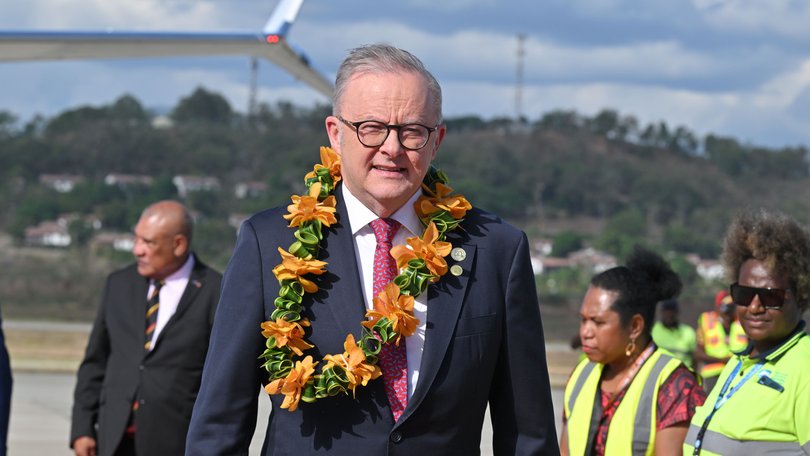Australia pledges billions to strengthen Papua New Guinea military and secure our northern flank against China
Papua New Guinea’s fledgling military will be closely integrated into Australia’s Defence Force under a sweeping new security agreement being signed this week.

Papua New Guinea’s fledgling military will be closely integrated into Australia’s Defence Force under a sweeping new security agreement being signed this week that also includes billions of dollars to counter China’s rival strategic reach in the region.
Just days after attending the Pacific Islands forum in Honiara, Prime Minister Anthony Albanese has flown into PNG’s capital Port Moresby declaring the northern neighbour is “moving forward” with Australia.
“If we have more interoperability, if we have more participation in each other’s defence forces, if we engage on a more day-to-day basis then it just strengthens (the) security of PNG, but also of Australia,” Mr Albanese said shortly after arriving.
Sign up to The Nightly's newsletters.
Get the first look at the digital newspaper, curated daily stories and breaking headlines delivered to your inbox.
By continuing you agree to our Terms and Privacy Policy.Mr Albanese is scheduled to sign the comprehensive new defence and security agreement with his counterpart James Marape on Wednesday, which would allow personnel from PNG to enlist in the ADF and eventually become Australian citizens.
“This is very significant indeed and Prime Minister Marape has shown great leadership — he is a good friend of Australia,” Mr Albanese said when asked if the treaty would elevate the bilateral relationship to the same level as New Zealand and the United States.
Both leaders are also expected to discuss numerous areas of the bilateral partnership beyond security cooperation, including economic growth, investment, infrastructure, development assistance, people-to-people links, and PNG’s new Rugby League team.
In his third visit to PNG as Prime Minister, Mr Albanese is also being joined by Defence Minister Richard Marles and Pacific Island Affairs Minister Pat Conroy to help celebrate the country’s 50th Anniversary of independence - the Golden Jubilee.
Mr Albanese will observe Jubilee formalities alongside the Royal Family’s visiting representative Prince Edward, whose brother King Charles III was in PNG to witness the country’s independence in 1975 on behalf of his mother Queen Elizabeth II.
“It’s a proud moment. This was a new democracy forming just to the north of our own nation, one in which Papua New Guineans and Australians had died side by side during World War Two of course,” Mr Albanese said.
Sources in Port Moresby say Australia has spent millions helping Papua New Guinea prepare for this week’s independence celebrations, including transporting Army howitzers and training PNG military personnel for ceremonial firing demonstrations.
The Nightly understands other allies concerned by China’s growing influence in the region, such as Japan and the United States, have also contributed large amounts of funding towards this week’s jubilee celebrations.
Australia’s defence minister has refused to confirm suggestions from his Papua New Guinea counterpart that the defence deal would include a provision similar to Article 4 of NATO’s founding treaty, which obliges members to consult if they feel threatened.
“PNG is obviously on our northern flank. It really matters that we have the very best relationship that we can have with PNG in a security sense,” Mr Marles told the Insiders program on Sunday when asked if the deal would restrict cooperation with China.
Australia has already committed over half a billion dollars to fund the development of Papua New Guinea’s strategically important Lombrum naval base, and the upgraded treaty is expected to contain billions of dollars’ worth of other initiatives.
During a visit to Canberra in June this year, the country’s defence minister Billy Joseph declared that “Australia is secure when Papua New Guinea is secure”. “The security and defence of both Australia and Papua New Guinea are inextricably intertwined given close proximity… PNG resilience and preparedness is also important to Australian defence and security,” he told the Australian Strategic Policy Institute.
“We have confidence that the ADF could recruit at least 1000 PNG personnel each year,” says Ross Thompson, a former Captain in the Queen’s Gurkha Engineers, who now specialises in Pacific Islands recruitment.
“We expect thousands will want to put their hand up, but the key will be a rigorous regional process to quickly assess fitness and aptitude so only the most capable candidates progress,” the managing director of PeopleIN told The Nightly.
Last week, Vanuatu delayed signing a crucial security and economic agreement with the Albanese government, citing concerns the draft $500 million deal could limit its ability to receive infrastructure funding from China.
Shadow Defence Minister Angus Taylor says the opposition welcomes any improvement in relations with South Pacific nations but insisted that any progress must be “real, not rhetoric”.

